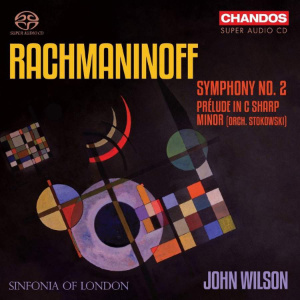
Sergei Rachmaninov (1873-1943)
Prélude, Op. 3 No. 2 in C sharp minor from ‘Morceaux de fantaisie’; orch. Stokowski (1892)
Symphony No. 2, Op. 27 in E minor (1906-07)
Sinfonia of London/John Wilson
rec. 2022, Church of St Augustine, Kilburn, London
Chandos CHSA5309 SACD [64]
My favourite recording of Rachmaninov’s Second Symphony is Rozhdestvensky’s studio account with the LSO made in 1988 and he is notably more leisurely than John Wilson here, taking respectively three minutes longer over the opening Largo movement, two minutes more in the Allegro molto and one minute longer over the last two movements, making a total of 66 minutes’ duration compared with Wilson’s which is 56:39. However, he takes the repeat, which Wilson does not. That obviously makes a big difference and as the cliché goes, “timings don’t tell the whole story” but I also find Rozhdestvensky’s manner more affectionate and characterful. Having said that, other favourite versions by Petrenko and Handley are both around the hour mark, so it would appear that Wilson is merely somewhat swift. I have to come to trust his judgement, as he now has a string of top-rate recordings behind him made with the Sinfonia of London, several of which I have designated as “Recommended” and even “Records of the Year”, including a superb rendition of the Third Symphony and the Isle of the Dead (review), so I approached this latest release with high expectations.
The orchestrated Prélude bears all the hallmarks of Stokowski’s extrovert persona and its Grand Guignol excess wouldn’t sound out of place in Fantasia; it makes an apt entrée into Rachmaninov’s sound-world, which is ever an unsettling admixture of lyricism, heartbreak and menace.
That famous brooding opening to the Second Symphony is as seductive and minatory here as one could wish and there is certainly no sense of undue haste in the ensuing sequence of cascading phrases which is less a melody and more a yearning cry. The first subject is first delicately traced but Wilson gradually ramps up the tension and I see – or rather hear – the rationale behind his swifter tempi; the momentum rarely lets up as he pushes on from one episode to the next. The accelerated passage beginning around fourteen minutes into this long movement is positively thrilling; only four minutes before the end of the movement does Wilson applying plenty of rubato and ask the orchestra to relax, breath and sing softly before the frantic coda with its percussive close.
The trepak-style dance with which the Scherzo opens is attacked with fervour its rhythmic and contrapuntal complexity heightened by the breakneck speed Wilson adopts – but this orchestra is never fazed by any technical challenge and its precision is a joy.
Only in the Adagio could I wish that Wilson did not have such good taste and would play that luscious tune more indulgently as Rozhdestvensky does. To be fair, Petrenko does not quite find the same magic, either, whereas Handley comes closer. However, My MWI colleague John Quinn mentioned in his review of the Petrenko disc that he found Rozhdestvensky “too broad”; these are of course questions of personal preference and Wilson’s greater refinement might be more to your liking, especially as the playing continues to be so silky and there is nothing too restrained about the great, central climax exactly halfway through the movement. The falling figure at 12:27 is absolutely exquisitely played, the aural equivalent of watching the last autumnal leaf spiral to the forest floor.
The finale, however, is for me again too tastefully played compared with Rozhdestvensky’s raucous circus show; I want more blaring bravado and wild abandon. Petrenko is also too careful – again, Handley catches the mood better. Of course, not all the movement requires Sturm und Drang but the high-points have to make maximum impact and an element of ferocity is missing in this highly civilised playing and I am left a little dissatisfied.
The excellence of the sound allows us to revel in both the colours of the composer’s orchestration and the virtuosity of the players here, but for my taste, beautiful l though the playing is, I would like more release at key points in the last two movements.
Ralph Moore
Help us financially by purchasing from





















